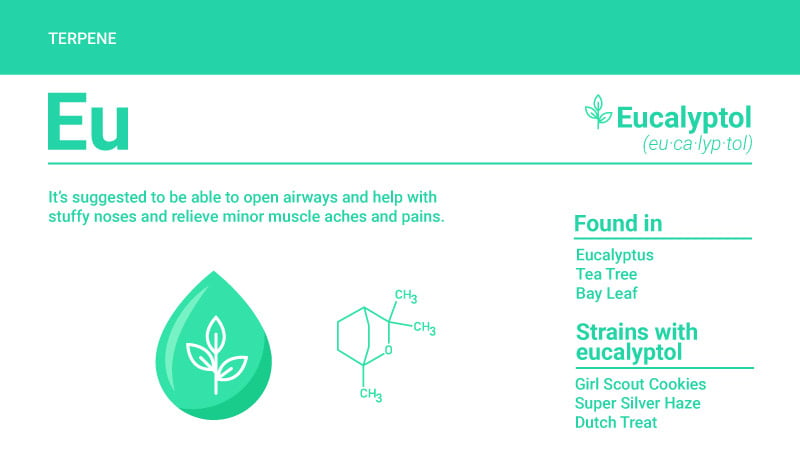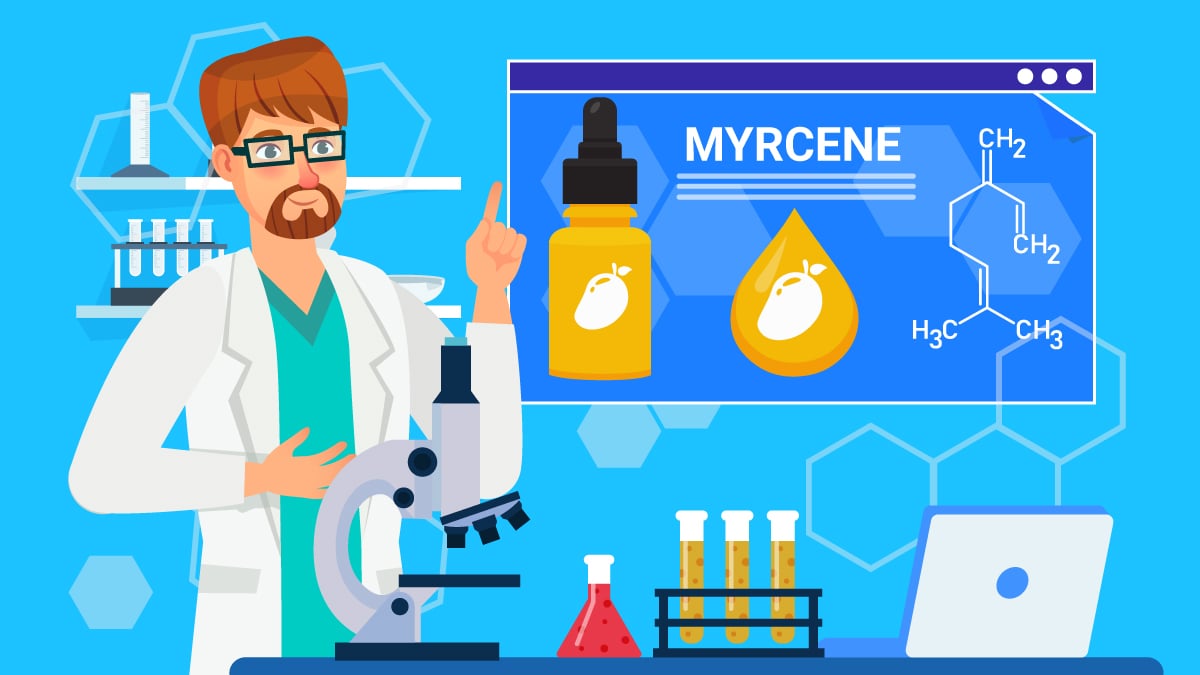Eucalyptol Terpene: Strains, Effects, Dosage, & More

Also known as cineol, eucalyptol is most abundant in the eucalyptus tree. This terpene is suggested to possess strong effects on respiratory function and is touted for its ability to open the airways, kill bacteria and fungi, and prompt the release of phlegm.
This terpene is also present in cannabis, rosemary, bay leaves, sage, sweet basil, and the camphor tree.
Today, we explain the ins and outs of the health benefits provided by eucalyptol — along with an overview of its aroma profile, chemical structure, and research studies.
What is Eucalyptol?
Eucalyptol was first discovered by French chemist Stanislas Cloez in 1870. But long before that discovery, herbal medicine touted eucalyptus as a cough suppressant, mood enhancer, and antibacterial agent. Today, eucalyptol still has a wide range of applications, from its prominent use in the skincare industry and a massage oil and aromatherapy product.
Many wellness companies also advertise eucalyptol to treat cold and sinus infections due to its bronchodilating properties. The tobacco industry has also used eucalyptol to its advantage, adding it to cigarettes to improve flavor.
Low doses of eucalyptol can be a culinary ingredient, but high doses can be toxic, negatively impacting the respiratory tract, reproductive system, and nervous system. Similar to other terpenes, such as cedrene, eucalyptol may constitute the chemical formulas of commercial insecticides.
When it comes to eucalyptol and insects, it can be attractive to male orchid bees, causing them to behave more territorially aggressively.
Learn more: What are Terpenes?
What Does Eucalyptol Smell Like?
Eucalyptol is a distinctive “cooling” aroma that smells refreshingly and has a calming effect on the user when applied in aromatherapy. That’s why many companies incorporate it into topical products such as balms, lotions, and rubs. Eucalyptol’s aroma is also redolent of that of tea tree.
If you waft your cannabis strain and it delivers menthol-like aromas, it may indicate higher than average levels of eucalyptol. While not as abundant as some other terpenes, such as myrcene or humulene, it can provide significant health benefits, especially for pain relief and fighting bacteria.
What Are the Effects of Eucalyptol?
Eucalyptol is a versatile terpene; you may find it in your medicine cabinet, at the spa, or in a sweet treat. You’ve probably taken eucalyptol in the form of cough drops or a bottle of mouthwash. Its trace amounts (0.002%) can be found in a pastry from the bakery, a chewy candy, or a soft drink. You may have even sprinkled eucalyptol unintentionally, perhaps through bay leaves or rosemary.
The health benefits of eucalyptol are very well documented compared to some other, less common terpenes, such as fenchol. Studies have shown eucalyptol to have far-reaching positive effects on the respiratory system, memory, and more.
Research shows that eucalyptol is:
- Anti-inflammatory
- Antioxidant
- Antibacterial
- Bronchodilating
- Neuroprotective
How Common is Eucalyptol in Cannabis?
As mentioned, eucalyptol isn’t one of the major cannabis terpenes. However, it’s arguably one of the most important minor terpenes in the plant. Some strains have higher levels of eucalyptol than others.
Here are 10 cannabis strains that contain high concentrations of eucalyptol:
1. Girl Scout Cookies
This indica-dominant hybrid is an energizing strain with powerful euphoric effects. Its main terpenes are limonene, caryophyllene, and humulene, with eucalyptol as the main secondary terpene. GSC is typically used for easing physical discomfort and nausea.
2. Super Silver Haze
This strain is a cross between Skunk, Northern Lights, and Haze. It comes with high levels of terpinolene, with myrcene and caryophyllene as the two other main terpenes. In addition, SSH is also pretty high in eucalyptol.
3. Dutch Treat
A THC-rich strain, Dutch Treat is a cross between Northern lights and Haze. It delivers energizing and euphoric vibes on top of relieving discomfort and tension. Aside from myrcene and ocimene as their two major terpenes, Dutch Treat has eucalyptol as one of its minor essential oils.
4. London Pound Cake
This strain provides excellent calming effects due to high caryophyllene, limonene, myrcene, and eucalyptol. Its THC content is measured at around 17%, which is quite average these days.
5. Ace of Spades
In this strain, phellandrene and eucalyptol are the two secondary terpenes, with caryophyllene, limonene, and myrcene in the foreground. The strain has 16% THC and is known for its deep relaxation combined with a smooth cerebral buzz.
6. Bubba Kush
Also known as Bubba OG Kush or simply Bubba, induces calming effects that result from the combination of terpenes like caryophyllene, limonene, and eucalyptol.
7. Headband
This energizing cannabis strain is a cross between OG Kush and Sour Diesel. Headband got its name from a funny sensation of slight pressure in the head surrounding the area of your ears, nose, and between the eyes. The main terpenes in Headband are myrcene, limonene, and caryophyllene. Eucalyptol is the most abundant minor terpene in the strain.
8. GMO Cookies
Also known as Garlic Cookies, this strain is very potent and psychoactive, with THC levels reaching up to 26%. GMO cookies are also popular among patients with chronic pain, depression, and nausea. The strain is rich in limonene, caryophyllene, and myrcene; it also contains moderate levels of eucalyptol.
9. Jolly Rancher
Another strain with relatively high levels of eucalyptol, Jolly Rancher contains 16% THC and 1% of CBG. It’s a very energetic strain popular among both recreational and medical users.
10. Arjan’s Strawberry Haze
In this strain, myrcene is the dominant terpene, with ocimene and linalool as its two additional terpenes. The main secondary terpene in ASH is eucalyptol, which explains the sweet and refreshing aroma profile.
You can check out our Cannabis Strain Terpenes HERE.
Plant Sources of Eucalyptol
Eucalyptol is most abundant in the eucalyptus tree, but there are many other species of plants that produce this unique terpene as well (albeit in much lower concentrations).
- Basil
- Black Pepper
- Cannabis
- Cinnamon
- Clove
- Eucalyptus
- Oregano
- Rosemary
Eucalyptol Research
A 2013 study posted by Oncology Reports found that eucalyptol suppressed the growth of colorectal tumor cells. Research is still in its infancy for now, but scientists in the study suggest that eucalyptol could be an important part of adjunctive cancer treatment [1].
Eucalyptol has also been shown in several placebo-controlled clinical trials, the golden standard in human research, to help with various respiratory disorders. The authors concluded that all conditions mentioned in the study could benefit from eucalyptol’s ability to improve lung function and reduce mucus ([2]).
Many of the health benefits of eucalyptol also stem from its anti-inflammatory and antioxidant properties.
A 2014 study published in Neurochemistry Research found that eucalyptol reduced inflammation markers caused by amyloid-beta peptides — a key factor in the development of Alzheimer’s. Although the study was conducted on petri dish models, other human studies have shown that using eucalyptus in rosemary oil positively correlates with cognitive performance [3].
Chemical Structure of Eucalyptol
Eucalyptol is classified as a cyclic monoterpenoid. It’s structurally related to other common terpenes, including pinene, borneol, camphene, citral, P-cymene, delta-3-carene, fenchol, geraniol, geranyl-acetate, isopulegol, limonene, linalool, myrcene, ocimene, phellandrene, sabinene, terpineol, terpinolene, and many others.
Eucalyptol Specs:
- IUPAC Name: 1,3,3-trimethyl-2-oxabicyclo[2.2.2]octane
- Type of terpene: Monoterpene
- Molecular Formula: C10H18O
- Molecular Weight: 154.25
- Boiling Point: 176.4 °C
Does Eucalyptol Get You High?
No, eucalyptol won’t get you high because it doesn’t interact with the brain as cannabinoids do. For example, cannabinoids like THC bind to cannabinoid receptors in the brain, triggering a range of responses associated with the cannabis high — including euphoria, sharpened senses, altered sense of time, a boost of appetite, and a giggly mood.
Terpenes, on the other hand, can influence your mood but not in a direct fashion. That’s why terpenes are psychoactive but not intoxicating.
Furthermore, terpenes such as eucalyptol can enhance the health benefits of cannabinoids by either providing their own complementary effects or by modulating the activity of CBD and THC.
Since eucalyptol has anti-inflammatory, antioxidant, and bronchodilating properties, consuming strains with a higher eucalyptol content can boost their therapeutic properties and make them more effective at easing discomfort, reducing swelling, boosting cognitive function, and opening up the airways.
Related: Do Terpenes Get You High?
Summary: What Makes Eucalyptol Special
Eucalyptol is a unique terpene with considerable health benefits. Although not abundant in cannabis, it can significantly boost the therapeutic effects of CBD and THC, resulting in an elevated mood, reduced discomfort, mental clarity, and protection against bacterial infections.
The terpene is mostly associated with another plant — eucalyptus. When you say “eucalyptus,” it’s difficult not to imagine the fresh menthol-like breeze running through your nostrils, which is exactly how eucalyptol smells like. You’ve probably consumed it in cough drops, mint sweets, or mouth cleaners.
Researchers are particularly interested in eucalyptus’s neuroprotective and anti-inflammatory effects, as it gives them a better insight into its potential use in managing neurological conditions.
References:
- Murata, S., Shiragami, R., Kosugi, C., Tezuka, T., Yamazaki, M., Hirano, A., Yoshimura, Y., Suzuki, M., Shuto, K., Ohkohchi, N., & Koda, K. (2013). Antitumor effect of 1, 8-cineole against colon cancer. Oncology reports, 30(6), 2647–2652. https://doi.org/10.3892/or.2013.2763
- Juergens, U. R., Dethlefsen, U., Steinkamp, G., Gillissen, A., Repges, R., & Vetter, H. (2003). Anti-inflammatory activity of 1.8-cineol (eucalyptol) in bronchial asthma: a double-blind placebo-controlled trial. Respiratory medicine, 97(3), 250–256. https://doi.org/10.1053/rmed.2003.1432
- Khan, A., Vaibhav, K., Javed, H., Tabassum, R., Ahmed, M. E., Khan, M. M., Khan, M. B., Shrivastava, P., Islam, F., Siddiqui, M. S., Safhi, M. M., & Islam, F. (2014). 1,8-cineole (eucalyptol) mitigates inflammation in amyloid Beta toxicated PC12 cells: relevance to Alzheimer’s disease. Neurochemical research, 39(2), 344–352. https://doi.org/10.1007/s11064-013-1231-9



